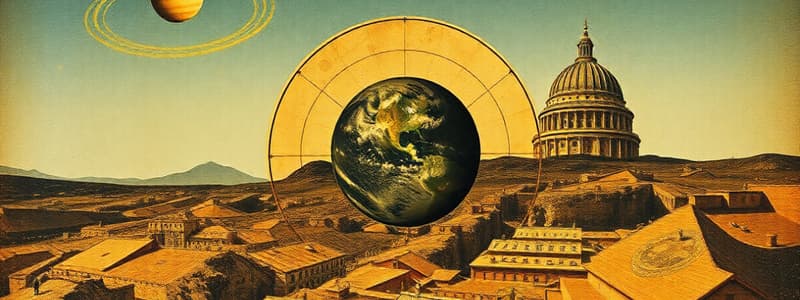Podcast
Questions and Answers
What did the heliocentric model proposed by Copernicus assert?
What did the heliocentric model proposed by Copernicus assert?
- All planets revolve around the Earth.
- The Earth is the center of the universe.
- Astrology is a legitimate science.
- The Sun is the center of the universe. (correct)
What was a significant societal belief before Copernicus' model gained acceptance?
What was a significant societal belief before Copernicus' model gained acceptance?
- The Sun orbits the Earth. (correct)
- Ptolemy’s geocentric model is incorrect.
- The Earth is just another planet.
- Astrology is not scientifically valid.
Why was Copernicus' work considered significant despite lacking mathematical explanations?
Why was Copernicus' work considered significant despite lacking mathematical explanations?
- It questioned and replaced Ptolemy's theories. (correct)
- It aligned with the Church's beliefs.
- It confirmed the geocentric model.
- It proposed astrology as a new science.
What was the societal impact of the acceptance of the heliocentric model?
What was the societal impact of the acceptance of the heliocentric model?
How did the beliefs of society before Copernicus affect the acceptance of his ideas?
How did the beliefs of society before Copernicus affect the acceptance of his ideas?
What was a key difference between the geocentric model and the heliocentric model?
What was a key difference between the geocentric model and the heliocentric model?
Which significant intellectual was NOT mentioned as contributing to the shift in societal views?
Which significant intellectual was NOT mentioned as contributing to the shift in societal views?
What role did astrology play in society before Copernicus’ heliocentric model?
What role did astrology play in society before Copernicus’ heliocentric model?
What major shift in thinking did Copernicus contribute to regarding astronomy?
What major shift in thinking did Copernicus contribute to regarding astronomy?
What was one significant consequence of Copernicus’ findings?
What was one significant consequence of Copernicus’ findings?
How did Darwin's works challenge contemporary views of humanity?
How did Darwin's works challenge contemporary views of humanity?
Which concept does Darwin's theory of evolution primarily rely on?
Which concept does Darwin's theory of evolution primarily rely on?
What was a reaction to Darwin's theories during his time?
What was a reaction to Darwin's theories during his time?
How did Darwin's perspective change the understanding of humanity's place in nature?
How did Darwin's perspective change the understanding of humanity's place in nature?
What distinction is Sigmund Freud known for in the field of psychology?
What distinction is Sigmund Freud known for in the field of psychology?
What was one of the societal impacts of Copernicus and his successors' work?
What was one of the societal impacts of Copernicus and his successors' work?
Flashcards are hidden until you start studying
Study Notes
Intellectual Revolutions
- An intellectual revolution is a period of significant change in the way that people think about the world. These changes can be due to new ideas, principles, and technologies.
- When science and technology drive these shifts, they are often called scientific revolutions.
Nicolaus Copernicus (1473-1543)
- Copernicus was a Polish astronomer and mathematician who proposed the heliocentric model of the universe.
- This model stated that the Sun is the center of the universe, and the Earth revolves around it.
- This challenged the geocentric model, which placed the Earth at the center of the universe.
- Copernicus' model lacked mathematical and physical explanations, but it was still significant for two reasons.
- The geocentric model was supported by the church and was tied to astrology.
- Copernicus' work sparked a shift from believing in astrology to embracing astronomy.
- Copernicus' work paved the way for future scientists like Tycho Brahe, Johannes Kepler, and Galileo Galilei.
- These scientists advanced our understanding of the universe through mathematical explanations.
- The findings of Copernicus and his successors changed society's view of astronomy, making it more acceptable.
- The popularity of Galileo's telescope brought science to the general public, which laid the foundation for popular science and science fiction.
Charles Darwin (1809-1882)
- Darwin was an English scientist whose works, "Origin of Species" and "Decent of Man," explored the evolution of species and mankind.
- These works were controversial, particularly among creationists and religious groups.
- Darwin's work suggested humans are subject to the natural laws of science.
- It challenged the prevailing view that humans were special creations.
- Darwin proposed that natural selection is the primary reason for human existence.
- This differed from creationist views that God created humans directly.
- Darwin's theory suggested that humans are not fundamentally different from other organisms, placing them in a continuum of life.
- Despite the controversy, Darwin's work gained support from many, including some religious figures.
- Further research has either supported or revised Darwin's theory of evolution.
- Today, Charles Darwin is recognized as the pioneer of evolutionary biology.
Sigmund Freud (1856-1939)
- Freud was an Austrian neurologist whose contributions to psychology are considered revolutionary.
Studying That Suits You
Use AI to generate personalized quizzes and flashcards to suit your learning preferences.



